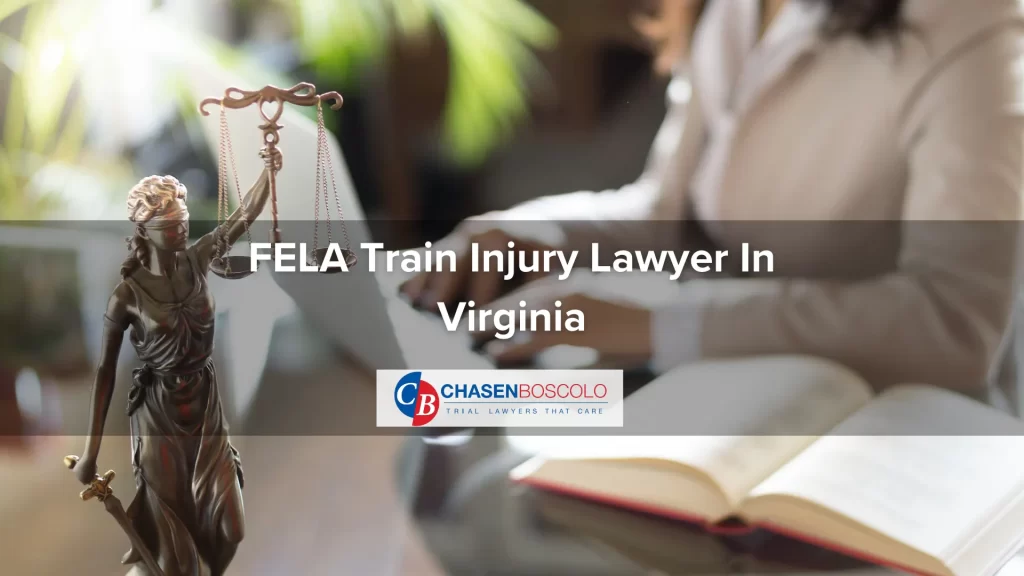
CHASENBOSCOLO represents railroad workers across the state of Virginia who were hurt in accidents while on the job. Our experienced Virginia FELA train accident lawyers have helped others just like you get full and fair compensation and benefits if their employer’s negligence caused them harm.
The Federal Employers’ Liability Act (FELA) is a federal law that was first enacted in 1906 but declared unconstitutional by the United States Supreme Court. The FELA Act passed in 1908 has withstood constitutionality tests and provides a federal system of recovery for railroad workers injured or killed on the job.
While FELA is similar to workers’ compensation in that it is designed to compensate workers injured on the job, there are major differences between FELA claims and workers’ compensation claims. Unlike workers’ compensation, a FELA claimant will have to prove that their employer was somehow negligent.
Railroad work is incredibly dangerous, and FELA was enacted to make sure that injured railroad workers have the means to recover compensation for their injuries. Depending on the nature of the injury involved, FELA claims can be very complicated.
Did you suffer severe injuries or was your loved one killed while working on a railroad in Virginia? Make sure that you have experienced legal counsel assisting you with your FELA claim.
CHASENBOSCOLO will fight to help you recover every penny of compensation you are entitled to. Call (703) 538-1138 or contact us online to take advantage of a free consultation.
Do I Need A FELA Train Injury Lawyer?
Railroads will often act very quickly to protect themselves after a worker is injured. Because a worker will have to prove that the railroad was negligent, many railroads will immediately look for a way to claim that an accident was the result of the worker’s negligence.
One way this is usually accomplished is by having a representative from an insurance company seem very friendly and concerned while asking the victim to provide a recorded statement. Questions that the agent asks are designed to get the victim to make statements in which they admit to negligence unknowingly.
You should always refuse to provide any recorded statement until you have legal representation. Some insurance companies may be more aggressive and offer you a lump sum settlement.
You are right to question whether the amount you are being offered is fair, because chances are very good that it will not be enough to cover your expenses and help you rebuild your life. By hiring an attorney, you will have an advocate on your side who will fight for the full and fair compensation that you are owed.
Why Choose CHASENBOSCOLO To Handle My Case?
 Barry M. Chasen founded CHASENBOSCOLO in 1986 with the philosophy to take care of the clients first and the money would take care of itself. We have since grown to now being a team of 25 attorneys and more than 90 professionals with over 100 years of legal experience.
Barry M. Chasen founded CHASENBOSCOLO in 1986 with the philosophy to take care of the clients first and the money would take care of itself. We have since grown to now being a team of 25 attorneys and more than 90 professionals with over 100 years of legal experience.
Our firm is available 24 hours a day, seven days a week. CHASENBOSCOLO has recovered hundreds of millions of dollars for thousands of clients.
Mr. Chasen and Benjamin T. Boscolo have both been awarded AV Preeminent ratings by Martindale-Hubbell. Mr. Chasen was named to the National Trial Lawyers Top 100 Trial Lawyers in 2013, and Mr. Boscolo was a workers’ compensation panelist for the National Football League Players Association (NFLPA).
CHASENBOSCOLO understands the tremendous financial stress many railroad injury victims are facing, which is why we offer the No Fee Guarantee® which means you do not pay anything until you get a monetary award. We will negotiate a fair and full settlement to your case, and we can also file a lawsuit when an insurance company does not make a satisfactory offer.
Types of FELA Train Injury Cases We Handle
Railroad workers can suffer a wide range of possible injuries on the job. Not all injuries result in immediate symptoms, but it is important for a railroad worker to seek the help of an attorney as soon as possible.
Some of the most common kinds of injuries include, but are not limited to:
- Back injuries
- Neck injuries
- Burn injuries
- Carpal tunnel syndrome
- Nerve damage
- Traumatic brain injury (TBI)
- Spinal cord injury
- Chemical exposure
- Respiratory issues
- Lung cancer
- Mesothelioma
- Paralysis
- Soft Tissue Injuries
- Internal organ damage
- Lacerations
- Fractures
- Wrongful death
Railroad workers can suffer injuries in many different kinds of accidents on the job. Remember that a worker does not have to prove that a railroad was entirely at fault for an accident, only that their negligence was a contributing factor.
Some of the most common causes of accidents on railroads include:
- Improper training of workers
- Defective equipment
- Failure to maintain equipment
- Trains moving too quickly
- Exposure to toxic chemicals and substances
- Unsafe work conditions
- Poor lighting
- Improper procedures
- Operator error
When you are injured on the job while working on a railroad, you should always make sure that you receive immediate medical attention. Even if you do not think that you were hurt, still go to a hospital to be sure.
Also, make sure that you report your injury to your employer as soon as possible. Make sure that you contact a lawyer before you speak to any insurance company or claims adjuster.
Frequently Asked Questions About FELA Train Injuries
How long do I have to file a FELA claim?
A person generally has three years from the date of their injury to file a lawsuit. Not all injuries are immediately apparent, however, and injuries caused by exposure to chemical substances or toxic materials or conditions can take several years before symptoms develop. In such cases, the limitations period begins on the date that the symptoms of the injury or illness first became known to the employee, or when the worker should have known.
What is light duty work?
Some railroads offer light duty assignments to injured workers as a way of providing continuing wages after suffering an injury. The actual nature of the work can vary, but you should be certain that you have your doctor’s permission to accept light duty work before agreeing to perform it. When you accept even light duty work without medical clearance, you run the risk of aggravating your injury and possibly worsening it. Worse yet, if you accept light duty in defiance of a doctor’s orders, then it can negatively affect the compensation you recover for your FELA claim.
What is comparative negligence?
Comparative negligence refers to a legal defense in which a plaintiff’s damages are reduced by their own degree of negligence. Comparative negligence is a common defense by most railroads in FELA claims, as a person who is largely responsible for their injuries will have their awards significantly reduced. For example, an injured railroad worker who is awarded $100,000 in a FELA claim but is found to have been 25 percent at fault for their injuries will have their award reduced by $25,000 and ultimately receive $75,000.
FELA Train Injury Statistics
According to the Bureau of Transportation Statistics, there were five train fatalities in 2017, including three derailments and two classified as other. The 301 train injuries included 149 derailments, 12 collisions, and 140 others. There were 1,625 total train accidents, including 1,183 derailments, 86 collisions, and 356 others.
The Federal Railroad Administration (FRA) reported that 783 railroads reported 8,470 accidents or incidents in 2018. These resulted in 660 fatalities and 5,954 nonfatal injuries.
The 1,356 train accidents included six fatalities and 178 nonfatal injuries. The 1,579 highway-rail grade crossing accidents or incidents included 205 fatalities and 567 nonfatal injuries. The 5,535 other incidents included 449 fatalities and 5,209 nonfatal injuries.
In train accidents excluding highway-rail crossing incidents, two railroad workers on duty, three trespassers, and one worker on duty were killed in 2018. Nonfatal injuries included 49 railroad workers, two employees not on duty, 119 passengers on trains, two trespassers, three contract workers on duty, one other contractor, and two non-trespassers off railroad property.
In highway-rail crossing incidents, one railroad worker on duty, 135 trespassers, and 69 non-trespassers were killed in 2018. Nonfatal injuries included 56 railroad workers on duty, 34 passengers on trains, 291 non-trespassers, 176 trespassers, two contract workers on duty, three other contractors, and five non-trespassers off railroad property.
Other incidents excluding highway-rail crossing incidents resulted in seven railroad workers on duty, three passengers on trains, seven non-trespassers, 427 trespassers, two contract workers on duty, one other contractor, one volunteer worker on duty, and one non-trespasser off railroad property killed in 2018. Nonfatal injuries included 2,787 railroad workers, 110 employees not on duty, 830 passengers on trains, 797 non-trespassers, 361 trespassers, 91 contract workers on duty, 210 other contractors, two volunteer workers on duty, two other volunteers, and 19 non-trespassers off railroad property.
Contact a FELA Train Injury Attorney in Virginia
If you sustained catastrophic injuries or your loved one was killed while working on a railroad in Virginia, do not think that you have to handle your FELA claim by yourself. A skilled Virginia personal injury lawyer will be able to help you navigate the legal process and recover just compensation for your injuries.
CHASENBOSCOLO will work closely with you and keep you updated every single step along the way. We can explore all of your legal options as soon as you call (703) 538-1138 or contact us online to receive a free consultation.





